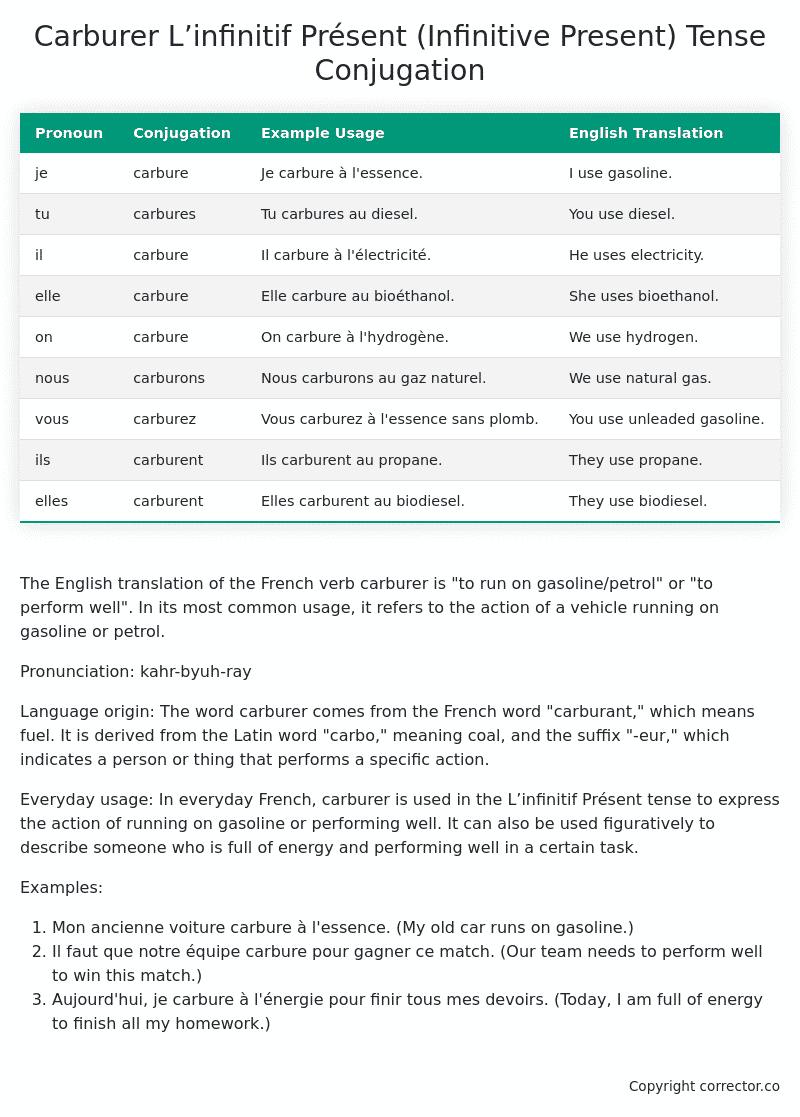L’infinitif Présent (Infinitive Present) Tense Conjugation of the French Verb carburer
Introduction to the verb carburer
The English translation of the French verb carburer is “to run on gasoline/petrol” or “to perform well”. In its most common usage, it refers to the action of a vehicle running on gasoline or petrol.
Pronunciation: kahr-byuh-ray
Language origin: The word carburer comes from the French word “carburant,” which means fuel. It is derived from the Latin word “carbo,” meaning coal, and the suffix “-eur,” which indicates a person or thing that performs a specific action.
Everyday usage: In everyday French, carburer is used in the L’infinitif Présent tense to express the action of running on gasoline or performing well. It can also be used figuratively to describe someone who is full of energy and performing well in a certain task.
Examples:
- Mon ancienne voiture carbure à l’essence. (My old car runs on gasoline.)
- Il faut que notre équipe carbure pour gagner ce match. (Our team needs to perform well to win this match.)
- Aujourd’hui, je carbure à l’énergie pour finir tous mes devoirs. (Today, I am full of energy to finish all my homework.)
Table of the L’infinitif Présent (Infinitive Present) Tense Conjugation of carburer
| Pronoun | Conjugation | Example Usage | English Translation |
|---|---|---|---|
| je | carbure | Je carbure à l’essence. | I use gasoline. |
| tu | carbures | Tu carbures au diesel. | You use diesel. |
| il | carbure | Il carbure à l’électricité. | He uses electricity. |
| elle | carbure | Elle carbure au bioéthanol. | She uses bioethanol. |
| on | carbure | On carbure à l’hydrogène. | We use hydrogen. |
| nous | carburons | Nous carburons au gaz naturel. | We use natural gas. |
| vous | carburez | Vous carburez à l’essence sans plomb. | You use unleaded gasoline. |
| ils | carburent | Ils carburent au propane. | They use propane. |
| elles | carburent | Elles carburent au biodiesel. | They use biodiesel. |
Other Conjugations for Carburer.
Le Present (Present Tense) Conjugation of the French Verb carburer
Imparfait (Imperfect) Tense Conjugation of the French Verb carburer
Passé Simple (Simple Past) Tense Conjugation of the French Verb carburer
Passé Composé (Present Perfect) Tense Conjugation of the French Verb carburer
Futur Simple (Simple Future) Tense Conjugation of the French Verb carburer
Futur Proche (Near Future) Tense Conjugation of the French Verb carburer
Plus-que-parfait (Pluperfect) Tense Conjugation of the French Verb carburer
Passé Antérieur (Past Anterior) Tense Conjugation of the French Verb carburer
Futur Antérieur (Future Anterior) Tense Conjugation of the French Verb carburer
Subjonctif Présent (Subjunctive Present) Tense Conjugation of the French Verb carburer
Subjonctif Passé (Subjunctive Past) Tense Conjugation of the French Verb carburer
Subjonctif Imparfait (Subjunctive Imperfect) Tense Conjugation of the French Verb carburer
Subjonctif Plus-que-parfait (Subjunctive Pluperfect) Tense Conjugation of the French Verb carburer
Conditionnel Présent (Conditional Present) Tense Conjugation of the French Verb carburer
Conditionnel Passé (Conditional Past) Tense Conjugation of the French Verb carburer
L’impératif Présent (Imperative Present) Tense Conjugation of the French Verb carburer
L’infinitif Présent (Infinitive Present) Tense Conjugation of the French Verb carburer (this article)
Struggling with French verbs or the language in general? Why not use our free French Grammar Checker – no registration required!
Get a FREE Download Study Sheet of this Conjugation 🔥
Simply right click the image below, click “save image” and get your free reference for the carburer L’infinitif Présent tense conjugation!

Carburer – About the French L’infinitif Présent (Infinitive Present) Tense
Forming the Infinitive Present
Common Everyday Usage Patterns
As a Verb’s Dictionary Form
After Modal Verbs
As an Imperative
In Infinitive Clauses
Interactions with Other Tenses
Present Tense
Future Tense
Conditional Tense
Passé Composé
Imperfect Tense
Subjunctive and Conditional Moods
Summary
Want More?
I hope you enjoyed this article on the verb carburer. Still in a learning mood? Check out another TOTALLY random French verb conjugation!


